Fort White: Water Issues – Finally, a Civil Meeting Where Intelligent Conversation May Lead to Progress
September 26, 2025 10:50 am | 5 min read
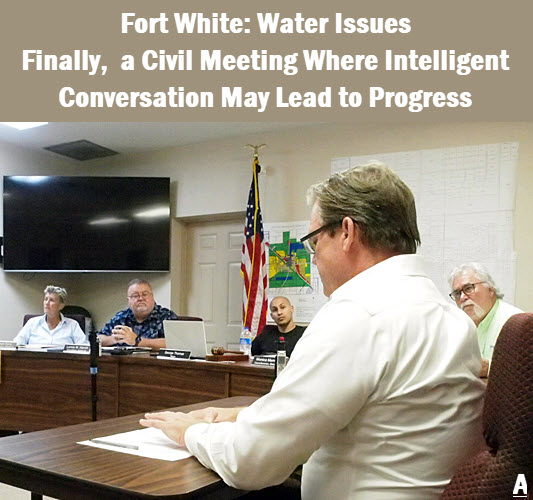
Fort White Town Council Attorney Rhett Bullard explains
the interlocal.
(Columbia County Observer photo and graphic)
FORT WHITE, FL – The Fort White Town Council met in special session last Friday, September 19, to discuss “water operations” – the operation of the Town’s water plant. Councilmen Bill Koon and Lonnie Harrell called the special meeting after the Town voted to take back the operation of the water plant from Columbia County.
Background
The September 19 special meeting was precipitated by years of hot-and-cold, off-and-on Fort White – Columbia County intergovernmental relations.
For decades, Fort White coasted along as a small rural community, largely oblivious to the world around it, as the godfathers in Columbia County took care of some of its needs: a community center, public library, and athletic fields. Its population is approximately 669, with fewer than 500 registered voters. The Town has no taxes and finances itself through various forms of state revenue sharing.
In the past, the Town received revenue from the sale of water, the kind that comes out of your faucet, but the County, in order to be eligible for grants because of the Town’s location in a critical springs and river area, paid the Town to run its water plant and bill its customers.
Over the course of the last few years, the Town and the County fell out, which led to the County canceling many interlocal agreements between the two governments and trespassing on Town property to capture and remove a dump truck and backhoe that it had previously given to the Town.
While the County was putting the squeeze on the Town, the Town’s County Commissioner, Rocky Ford, took no action to defend the Town and occasionally caused public disturbances at the Town meetings.
Needing a source of revenue and looking to recapture control of its future, the Fort White Town Council met on September 19 in a special meeting to discuss its options regarding its water plant, which is controlled by an interlocal agreement approved in 2021, that neither the County nor the Town has canceled.
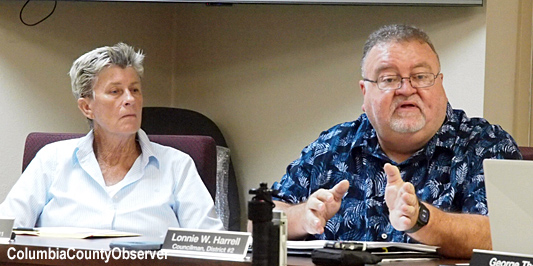
Fort White Councilman Lonnie Harrell stuck to his guns
regarding the special meeting notice. Councilwoman
Kathryn Terry supported him.
The Special Meeting
On September 16, Councilmen Lonnie Harrell and William "Bill" Koon called a special meeting to discuss "Town water operations."
Mayor George Jacob Thomas changed the agenda for the meeting adding: “billing software decision” and “plant operator decision.”
As has happened in the past, Mayor Thomas added additional items to a special meeting that he did not call. Fort White has not established any rules, except those outlined in the Town Charter for calling special meetings. It is the general practice in Florida that special meeting agendas do not have added items once published. However, items can be removed.
Additions for "billing software decision" and "plant operator decision" sparked objections.
Councilman Harrell moved to strike items 2 and 3. Councilwoman Terry seconded the motion.
Town Attorney Rhett Bullard, putting on his councilman's hat, argued that the items fell under the broad category of "water operations." After debate, the agenda was approved unanimously, with the strikes, limiting the focus to the purpose stated in the meeting notice, “water operations.”
Before the vote, during public comment, community activist and business owner, Alex Veiga supported including the additional items.
The Interlocal Agreement between the Town and County
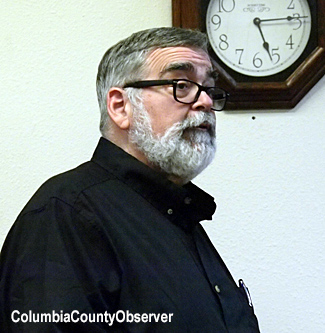
County Manager David Kraus explained that the County has
essentially called a truce to the County's hostilities
against the Town.
The interlocal agreement with Columbia County requires written notice at least 12 months before October 1 to terminate on the next October 1.
The Council unanimously supported ending the agreement (no revenue to the Town currently) but determined it needs time for planning.
County Manager David Kraus told the Council that the County’s priority is public health and a smooth, uninterrupted transition, a.k.a., not “turning off” service. He said, “The only reason I'm here is to say the County is willing to work with the Town any way we can. As the county manager, my concern is about public health and safety.”
Mike New, PE, a Senior Client Manager for Woodard & Curran, has decades of experience in water utilities. He provided the Town with advice on a course of action that would protect the Town's interests.
Mr. New emphasized that the Town must follow the termination procedures outlined in the interlocal agreement with Columbia County. He clarified that proper written notice must be given by October 1, 2025, for termination to take effect on October 1, 2026, unless both parties mutually agree to shorten the timeline. He warned against violating the agreement to avoid legal risks.
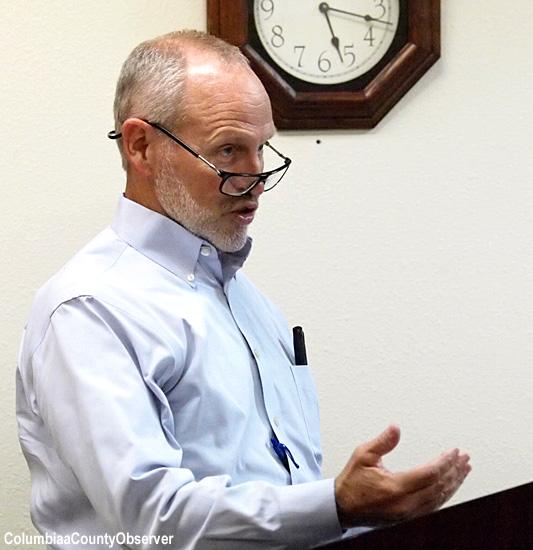
Mike New, PE, addresses the Council. Mr. New gave the
Council members free advice which they seemed to
embrace.
What’s the Plan – Sam?
Mr. New stressed the importance of a well-planned transition, noting that rushing the process could lead to service disruptions or operational failures. He recommended developing a detailed checklist of responsibilities (e.g., chemical supply contracts, regulatory notifications) to ensure a seamless handover.
Mr. New offered his firm’s services, while mentioning that other firms could also conduct a feasibility study evaluating all operational options (e.g., in-house management, contracting with third parties, partnering with the utility authority). This study would include cost analysis, revenue projections, infrastructure assessments, and rate sufficiency evaluations.
Mr. New explained that the cost of a feasibility study could range widely, depending on the scope (e.g., $10,000–$15,000 for a high-level report, increasing for more detailed assessments).
Mr. New encouraged the Town to engage with the Florida Rural Water Association and other experts to gather data and insights. He also noted that the rate study being done by Raftelis for the North Florida Water Utility Authority might include Fort White-specific analysis that could inform decision-making.
Mr. New highlighted that water and wastewater systems often have interdependent finances, with water revenues sometimes subsidizing wastewater operations. He urged the Council to base decisions on accurate cost and revenue data to avoid financial shortfalls.
Mr. New’s advice and cautionary remarks seemed to resonate with the Council.
Shannon Roberts, Exec. Dir. North Florida Water Utility Authority
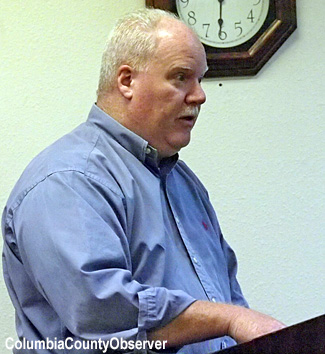
North Florida Exec. Dir. Shannon Roberts addresses the
Council. It was surprising that he didn't know the
provisions of the Raftelis rate study as it related to
Fort White.
Shannon Roberts, representing the North Florida Water Utility Authority, spoke multiple in between having his head buried in his phone.
Mr. Roberts explained that the utility authority's budgeting and cost allocation methods differed from the County's, cautioning the Town against mixing County and Authority numbers. He said, “People may just assume, well, the utility expenses have to be this -- not necessarily.”
Mr. Roberts endorsed a third-party feasibility study and offered cooperation, including providing data and answering questions. At the same time, he told the Council, “I'm biased. I want to do it all and continue doing that.”
Mr. Roberts told the Council that he didn’t know if Fort White was incorporated into the Raftelis rate study. He said, “I think Fort White got incorporated into that. What I think I'd like to do, just do a little loop on that, is to find out if they did?”
In the past, County Manager Kraus said that, as far as Columbia County goes, Fort White would be getting a rate study, as well as Ellisville.
When the subject of wholesale water rates came up, Mr. Roberts said he didn’t know if wholesale rates were included in the Raftelis rate study.
Councilman Bill Koon: He wants what’s best for Fort White
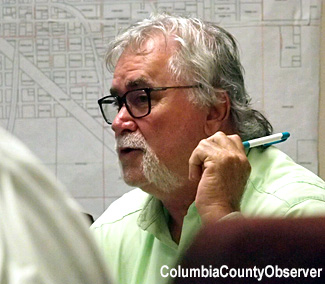
Councilman William "Bill" Koon.
Councilman Bill Koon said, “I'm open to look at all of it, and whatever’s best for Fort White, whatever is best for the Town of Fort White. That's what we should do.” … I think we need to have a workshop on it; talk about it and discuss what we should and shouldn't do.”
Epilogue
The Town will continue the water conversation on October 6 at 5 pm with a workshop.
